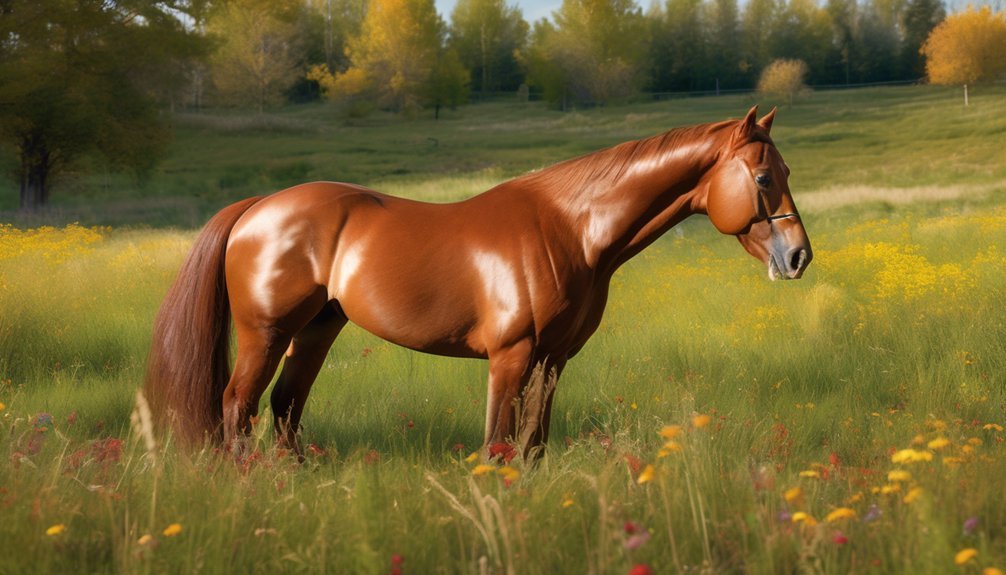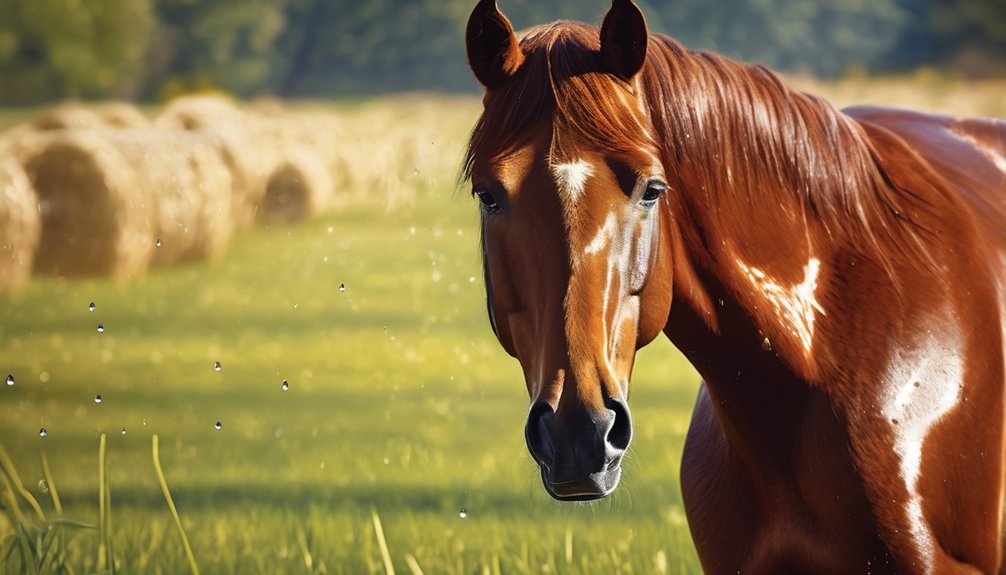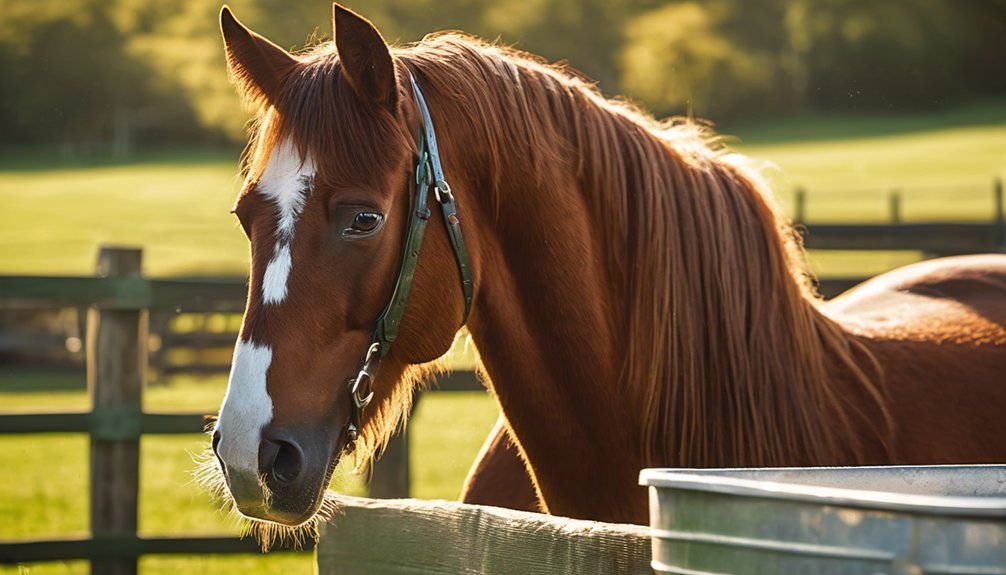
A horse's coat reflects its overall health, a horse's diet influences its coat quality, and a horse's well-being is tied to its nutrition. By understanding how specific nutrients affect coat condition, you can make informed choices for your horse's feed. Factors such as protein, fats, vitamins, and hydration play critical roles. Discover how these elements come together to create not just a shiny coat, but also a healthier, happier horse.
Key Takeaways
- Quality fiber sources, like hay and pasture grasses, support digestive health, which directly influences coat condition.
- Fats, such as flaxseed and fish oil, enhance coat shine and help absorb fat-soluble vitamins.
- High-quality protein sources provide essential amino acids necessary for keratin production, improving coat texture and luster.
- Vitamins A, E, and biotin are vital for skin health, coat shine, and overall coat growth.
- Adequate hydration, through fresh water and wet feed, is crucial for maintaining skin elasticity and coat appearance.
Essential Nutrients for a Healthy Coat

When it comes to maintaining a vibrant, healthy coat for your horse, understanding the essential nutrients is crucial.
You'll want to focus on quality fiber sources, as these promote digestive health, which directly influences coat condition. Look for feed rich in hay and pasture grasses; these provide the roughage necessary for optimal digestion.
Additionally, consider incorporating antioxidants into your horse's diet. Vitamins E and C, found in fresh fruits and vegetables, offer antioxidant benefits that help combat oxidative stress and support skin health.
The Importance of Fats in Equine Diet
While you might think of fats primarily as a source of energy, they also play a pivotal role in maintaining your horse's coat health. Fats help absorb fat-soluble vitamins and contribute to that sought-after coat shine. Including quality fat sources in your horse's diet can make a noticeable difference in their appearance and overall well-being.
| Fat Source | Benefits | Recommended Amount |
|---|---|---|
| Flaxseed Oil | High in omega-3 fatty acids | 1-2 cups daily |
| Coconut Oil | Easily digestible energy | 1 cup daily |
| Fish Oil | Supports skin health | 1-2 tablespoons daily |
| Vegetable Oil | Enhances coat shine | 1-2 cups daily |
| Rice Bran Oil | Nutrient-rich fat source | 1 cup daily |
Incorporating these fats can truly elevate your horse's coat health.
Protein: Building Blocks for Coat Quality

Protein serves as the foundation for a horse's coat quality, influencing everything from texture to luster. To ensure your horse boasts a vibrant coat, you need to focus on high-quality protein sources.
These sources, such as alfalfa, soybean meal, and grass hay, provide essential amino acids crucial for keratin production, the protein that forms hair. Without adequate protein, your horse's coat may appear dull and brittle.
Remember, not all proteins are created equal; the right balance of amino acids, particularly lysine and methionine, enhances coat health significantly.
Regularly assess your horse's diet to ensure it meets their protein requirements, especially during times of growth or shedding. A well-nourished horse shines from the inside out, reflecting the care you provide.
The Role of Vitamins and Minerals
Vitamins and minerals play a crucial role in maintaining your horse's coat health, as they contribute to essential biochemical processes that support growth and maintenance.
Ensuring your horse gets adequate vitamins and minerals can enhance coat shine and texture. Here are some vital components to consider:
- Vitamin A: Supports skin and coat health.
- Vitamin E: Acts as an antioxidant, promoting a healthy shine.
- Biotin: Essential for healthy hoof and coat growth.
- Zinc: Aids in skin repair and immune function.
- Calcium and Phosphorus: Crucial for overall growth and health.
You can find vitamin sources in a balanced diet, but mineral supplements may be necessary to fill in any gaps.
Prioritize your horse's nutritional needs for optimal coat vitality.
Hydration and Its Impact on Coat Health

Hydration is essential for maintaining your horse's coat health, as it directly affects skin elasticity and overall appearance. When you ensure your horse has access to adequate hydration sources, you're supporting not only their coat but also their skin's vitality. Proper water intake keeps their skin supple, reducing dryness and flakiness, which can dull their coat's shine.
| Hydration Source | Impact on Coat Health |
|---|---|
| Fresh Water | Promotes skin elasticity |
| Electrolyte Solutions | Helps maintain hydration levels |
| Wet Feed (e.g., beet pulp) | Increases water intake |
| Grass | Natural water source |
Creating a Balanced Diet for Optimal Coat Condition
To ensure your horse's coat remains vibrant and healthy, it's crucial to create a balanced diet that meets all their nutritional needs.
Focus on the right mix of nutrients while considering feeding frequency to optimize absorption. Here are key components to include:
- Quality forage for essential fiber
- High-quality grains for energy
- Omega-3 and Omega-6 fatty acids for coat shine
- Vitamins A, E, and biotin for skin health
- Appropriate dietary supplements to fill nutritional gaps
Adjusting the feeding frequency can help maintain digestive health, allowing your horse to thrive.
Monitor their condition regularly, and don't hesitate to consult a veterinarian for personalized dietary advice.
A well-rounded diet won't only enhance your horse's coat but also support overall wellbeing.
Frequently Asked Questions
How Does Seasonal Change Affect Horse Coat Health?
Seasonal changes trigger your horse's shedding process, leading to fluctuations in coat thickness. As temperatures rise or fall, you'll notice variations in their coat's density, which can impact overall health and comfort during transitions.
Can Supplements Improve Coat Quality?
Yes, certain supplement types can enhance coat quality by providing essential coat nutrients. Omega fatty acids, biotin, and vitamins improve shine and texture, helping your horse achieve a healthy, vibrant coat that turns heads.
Does Age Influence a Horse's Coat Condition?
Imagine a tree, its leaves aging gracefully. Just like that tree, older horses face age-related changes that can affect their coat condition. As they mature, you'll notice variations in texture and luster—an inevitable part of life.
Are Certain Breeds More Prone to Coat Issues?
Certain breeds do show more coat issues, often due to genetic predispositions. For instance, coat color can influence susceptibility to skin conditions, revealing how breed characteristics affect overall coat health and maintenance needs.
How Can Stress Impact a Horse's Coat Health?
Just like a wilted flower, your horse's coat can suffer under stress. Stress hormones can disrupt coat texture, leading to dullness and shedding. Managing stress is crucial for maintaining that vibrant, healthy shine in their fur.
Conclusion
In conclusion, just like a painter needs quality brushes and vibrant colors to create a masterpiece, your horse requires a balanced diet to achieve a stunning coat. By focusing on essential nutrients—proteins, fats, vitamins, and minerals—you're ensuring your horse's coat shines with health. Remember, hydration is the canvas; without it, even the best ingredients can't produce brilliance. Invest in their nutrition, and you'll see the beautiful results that reflect your horse's overall well-being.





